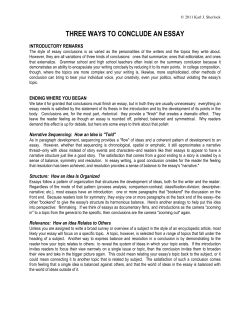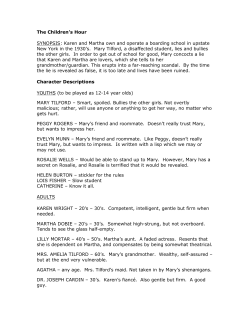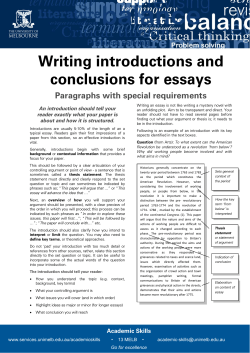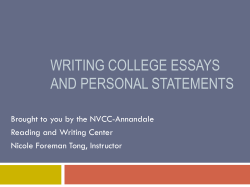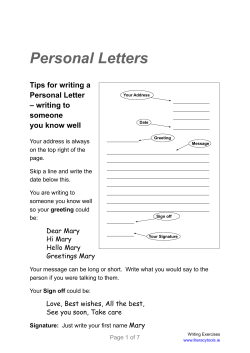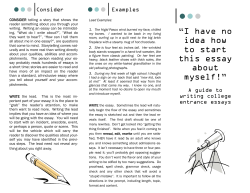
How to Raise Your Scores on the Bar Exam Essays Part I:
How to Raise Your Scores on the Bar Exam Essays Part I: How to Write Better Bar Exam Essays Mary Campbell Gallagher, J.D., Ph.D. www.BarWrite.com © 1991,1996, 2006 by Mary Campbell Gallagher & Co., Inc. All Rights Reserved. ® BarWrite is a Registered Mark of Mary Campbell Gallagher & Co. Inc. Part I: How to Write Better Bar Exam Essays Mary Campbell Gallagher, J.D., Ph.D. The booklet “How to Raise Your Scores on the Bar Exam Essays” (part I and II) are excerpted chapters from Dr. Gallagher’s Scoring High on Bar Exam Essays: InDepth Strategies and Essay-Writing Practice that Bar Review Course Don’t Offer book. To order the book Scoring High on Bar Exam Essays, contact: BarWrite® P.O. Box 1308 Gracie Station New York, NY 10028-0010 Phone: 212-327-2817 Email: Staff@BarWrite.com Website: www.BarWrite.com Published by: Barwrite Press Publish date: 1991, 1996, 2006 ISBN-13: 9780970608819 ISBN-10: 0970608810 Format: Paperback , 284 pages © 1991, 1996, 2006 Mary Campbell Gallagher & Co., Inc. All Rights Reserved. BarWrite® is a Registered Mark of Mary Campbell Gallagher & Co. Inc. No part of this booklet may be used or reproduced in any form or transmitted in any form or by any means, electronic or mechanical without prior written permission from the publisher, except for brief quotations embodied in critical essay, article and review. These essays, articles and/or reviews must clearly credit and state the correct book title, ISBN, and author by name. Page 3 www.BarWrite.com © 1991,1996, 2006 by Mary Campbell Gallagher & Co., Inc. All Rights Reserved. ® BarWrite is a Registered Mark of Mary Campbell Gallagher & Co. Inc. Part I: How to Write Better Bar Exam Essays Mary Campbell Gallagher, J.D., Ph.D. Part I: How to Write Better Bar Exam Essays The following are the keys to raising your essay scores: 1. Learn basic New York law word-for-word. Memorize the most basic law in the eight to ten subjects that are almost always on the New York essay exam. Bar exam graders tell me that they give the credit principally for accurate and complete presentation of law. Good legal analysis flows first from clear and accurate statements of law. I recommend using the "Law-in-a-Flash" flash cards, the ones in the yellow boxes. The telephone number for the publisher, Aspen Law Books, is (800) 3173113. If you are taking the Pieper Bar Review ((800) 635-6569), memorize as many mnemonics as you can. In the Gallagher Bar Training Schools, every student memorizes the basic law, and there are daily quizzes on those key rules of law. 2. Learn to manage time on the examination. Train yourself to stay within the time allowed. If you do not finish the essay questions, it is unlikely that you will pass the exam. Students come to me, however, who have taken the New York examination ten or more times and never finished the essays! If you want to pass the exam, it is key to teach yourself to finish each New York essay in thirty-five to forty minutes. In the Gallagher Bar Training Schools, students "write to the clock." They learn to write a paragraph in six minutes. They train to finish their bar exam essays on time. 3. Learn to read the interrogatory with care and to answer it fully. To maximize your score, you must treat the bar examiners with respect, paying attention to precisely what it is that they are asking for. In the Gallagher Bar Training Schools students practice reading and interpreting the bar examiners' questions every day. 4. Learn to outline and to organize the essay efficiently. In order the treat the four or five main rules of law in each New York essay within the time allowed, you must start with a good outline. Exam essay writing is a species of speed writing, and speed writing requires efficient outlining. In the Page 4 www.BarWrite.com © 1991,1996, 2006 by Mary Campbell Gallagher & Co., Inc. All Rights Reserved. ® BarWrite is a Registered Mark of Mary Campbell Gallagher & Co. Inc. Part I: How to Write Better Bar Exam Essays Mary Campbell Gallagher, J.D., Ph.D. Gallagher Bar Training Schools, students outline real New York essay questions every day. They get to be really good at it. 5. Learn about the Gallagher Bar Training Schools at www.BarWrite.com . These are your keys to success on the bar exam essays. Knowing the law, managing your time, answering precisely the question asked, outlining for a lawyer-like presentation. Warm good wishes! First Rules for Writing Successful Answers 1. Know the law. It may seem unlikely that students who have spent three years in law school and many hours in a bar review course still go into a bar examination without knowing basic law. It may also seem unlikely that the British had to take their infantrymen off the beach at Dunkirk in civilian rowboats. Unfortunately, both are true. Students do emerge from law school without having learned the legal analysis and legal theory their professors had hoped to teach and without the fundamentals of black letter law. Worse still, just as the British were not equipped to evacuate the beach at Dunkirk, so the law students are not equipped with skills for studying law. They must approach the bar review course with solid determination in order to learn the law. And so must you. You will never know enough law to pass the bar examination if you do not take it seriously. Take it seriously. Pay attention in your bar review course. Make (or buy) flash cards for the basic definitions in each area of law on which you will be tested. Burrow in and master the fundamental definitions in each area of law, even if the fine points momentarily escape you. For basic "issue spotting" there is an excellent series of books prepared by Beatrice Taines, available either from law book stores or from Prima Facie Press ( P.O. Box 82, Walnut Creek, CA 94597-0082). 2. Use words like a lawyer. To sound like a lawyer you must call things by their legal names. You have to use the right "buzzwords" as my Navy friends say. Avoid sounding like someone giving kitchen table advice and sound like the person the community looks up to, a person with professional competence. Would you want to go to a doctor who always called the abdomen the "tummy"? The same consideration applies to Page 5 www.BarWrite.com © 1991,1996, 2006 by Mary Campbell Gallagher & Co., Inc. All Rights Reserved. ® BarWrite is a Registered Mark of Mary Campbell Gallagher & Co. Inc. Part I: How to Write Better Bar Exam Essays Mary Campbell Gallagher, J.D., Ph.D. lawyers, except possibly more strongly, since the lawyer's craft is primarily one of words. Using lawyer like language will help you to study for the bar examination. And it will help you to write successful essays on the bar examination. Vocabulary exists in a web, not a vacuum. Every word is tied by association to hundreds of other words. The legal terms in a lawyer's vocabulary are tied to other words in the same field of law and to related ideas in other fields of law. Once you become accustomed to using legal vocabulary in your own thinking and writing, you will find that it enriches your access to the law. It will do so even while you are studying. It will also do so when you sit down to write the bar examination. 3. Write a slow, deliberate, full, and lawyer-like answer. Anxiety and impulsiveness often act as stumbling blocks to the production of a professional essay. They lead the writer to go straight for "the answer," instead of going through all the steps in a lawyer-like way. Suppose, for example, that the question concerns a will. One of the legatees renounces his bequest, but he has issue who may (or may not) be entitled to inherit, given the conditions set out in the fact pattern. Many students will go straight to that difficult issue and spend all of their time on it, even though, or especially when, that is an issue on which they are insecure. Such Anxious Andys are moths drawn to the flame of difficult issues. They burn themselves up on the hot spots in the questions. When I ask them why, they always say, "That's what I thought the question was about." Now hear this. The question is always "about" one thing: whether you, the exam taker, can reason and write like a lawyer. The question is never, not even once, about whether you know the "right answer" to the most difficult and challenging issue raised by the essay fact pattern. Every single wills question begins with one issue: Is there a valid will? (I assume there is no question as to whether the testator is in fact dead. That issue, of course, precedes the question of whether his will is valid.) So you start out by writing: "Under the law of [your state], the requirements for a validly executed will are as follows: . . ." and you spell out those requirements. You go on: "Here, . . . " and you show that this will has (or does not have) each of those elements, Then you draw your conclusion: "Therefore, this will is/is not valid." THAT IS WHAT THE QUESTION IS "ABOUT": LAWYER LIKE ANALYSIS. 4. Display the logical structure of the answer. Page 6 www.BarWrite.com © 1991,1996, 2006 by Mary Campbell Gallagher & Co., Inc. All Rights Reserved. ® BarWrite is a Registered Mark of Mary Campbell Gallagher & Co. Inc. Part I: How to Write Better Bar Exam Essays Mary Campbell Gallagher, J.D., Ph.D. Because many students aim straight for the part of the question that they know least about, they never go through the lawyer like motions that display not only their own mastery of the subject matter, but the logical structure of the answer. Other students take more time and set out an impressive number of the fundamental principles of that area of law, but their answers, too, fail to set out the logical structure of the subject. They twist the law and the facts together. They put the conclusion in the middle of the paragraph instead of at the beginning or at the end. They are full of the words "because" and "although," and their clauses are heaped upon each other so profusely that it would take a patient reader days to disentangle their work. Needless to say, the bar examination grader does not have days to spend. He may only have a minute or two for the full answer. By not displaying the logical structure of his answer, the student forfeits the grade he could have achieved. 5. Finish within the time allowed. Part of doing a job in a lawyer like way is finishing it within the time allowed. The practice of law is full of time limitations. There are periods of time for the return of service and responses to motions. There are statutes of limitations within which actions must be filed. There are periods for the response to interrogatories and the production of documents. There are tax filing dates. There are dates for the probate of wills. No matter what type of law the practitioner practices, he is always in the midst of a busy calendar. He must always do things within a time limit. He must always cut short his research, draft his document to size, produce his complaint on time. So it is with the bar examination. Many bar candidates, however, launch themselves into writing an answer to a question for which they havebetween thirty minutes and an hour with no idea at all where their answer is going not how much time and space their first paragraph ought to occupy. They do not plan. They have, indeed, no visualization or idea of what that whole is of which their first paragraph will be but one part. They have no idea how many parts of that kind the whole will require. Naturally, not having divided the answer to the question into time segments, they have no idea they are behind on time until the gong sounds, the gate comes down, and it is too late to add more. 6. Organize by rules of law. Because many students read the questions looking for "the answer" they begin their essay answers with "the answer" and don't know where to go from there. Page 7 www.BarWrite.com © 1991,1996, 2006 by Mary Campbell Gallagher & Co., Inc. All Rights Reserved. ® BarWrite is a Registered Mark of Mary Campbell Gallagher & Co. Inc. Part I: How to Write Better Bar Exam Essays Mary Campbell Gallagher, J.D., Ph.D. Other students, those who start with the part of the question they know least about, begin writing in the hope that "the answer" will somehow occur to them while they are writing. Still other students are trained in, "issue spotting." They are ahead of those poking around looking for "the answer," if only because they are likely to find more than one issue and so have rather more to say than the others. However, far too many of them can spot an issue and start a sentence that begins with "The issue is," but do not know where to go from there. They cannot integrate a statement of issues into a lawyer-like treatment of the law, with the application of the law to the facts. 7. Use separate paragraphs for each major rule of law. The paragraph is the principal unit of writing. In general, each major rule of law becomes the major building block of one paragraph. This helps the grader to grade your paper and makes your paper easier to read. However, related rules of law leading to one conclusion may all go in' one paragraph. 8. Leave ample white space between paragraphs. Unless there is a great paper shortage in your state, ask for plenty of bluebooks at the beginning of the examination. Begin every paragraph on a new page, not at the top, but in the middle of the page. That way you will have space to add new rules of law and new conclusions. You will not have to write in tiny, cramped script, with complex sets of directional arrows that confuse the grader. Chances are good that you will wish to add something to your essay after you have written it. Be prepared. Leave plenty of white space. No one ever lost points on a bar examination because there were large white spaces between his paragraphs. If you are leaving a large white space at the bottom of a page, it is wise to write "continues" in the lower right comer so as to alert the grader to turn the page and continue reading. 9. Use section headings to guide your reader. Label your paragraphs and put the label at the top of the page. Negligence might be the label on one paragraph. Strict Product Liability might be the label on another paragraph in the same essay. Likewise, where two or more paragraphs deal with the same t opic, label each section. Smith's Case Against Jones may be the label on one section. The next section may read: Counterclaims. The third section may be labeled Defenses. You are helping the grader while helping yourself to keep organized and on track. And your headings will help you to confirm that you have covered all the points on your outline. Page 8 www.BarWrite.com © 1991,1996, 2006 by Mary Campbell Gallagher & Co., Inc. All Rights Reserved. ® BarWrite is a Registered Mark of Mary Campbell Gallagher & Co. Inc. Part I: How to Write Better Bar Exam Essays Mary Campbell Gallagher, J.D., Ph.D. 10. Use short declarative sentences. There will be time to work on your legal style after you become a member of the bar. You will be able, then, to cultivate the flowing prose of Benjarrdn Cardozo. In the meantime, aim for simplicity. The grader of the bar examination simply may not have the time to interpret a complex sentence. Write in crisp, clear, simple sentences. Not complex sentences, not compound sentences, but simple sentences ( e.g.; "The five elements of negligence are duty of care, breach of duty, cause in fact, legal cause, and harm."). Avoid "because," "although," and other inducements to put the principal idea into a subordinate clause. Always keep the horse before the cart. Simple sentences are key. 11. State your conclusions in short, numbered sentences on the first page of your bluebook. Placing all of your conclusions on the first page of your bluebook simplifies life for the grader. Do it. Your first page will look something like this, depending on the number of major issues in each essay in your state: Jones is liable in negligence; Nifty Widget Co. is liable in strict product liability; Nifty Widget Co. will fail in its attempt to assert the statute of limitations as a defense. 12. Go for every single part of a point of credit. Is there a definition of a term of art that you can add? Is there an exception to a rule that you should note? Would service in fact have been within the statute of limitations had the statute ran on a holiday or Sunday? Do not add irrelevant or superfluous material. Do add those refinements that a good lawyer would add to a brief. They can raise your grade. 13. Do not be intimidated or discouraged; handle every single issue of law, whether or not you are expert in it. The chances are that most students begin their bar review courses with much the same knowledge. All have an equal opportunity to learn about new fields of law during the bar review course. Trusts and estates, for example, and domestic relations are major areas covered in many state bar examinations. Many law school graduates have never started on those fields of law, however, before they start learning them for the bar examination. If you do not know those fields, you are just like thousands of others. If you do know those fields, you are starting out ahead. Page 9 www.BarWrite.com © 1991,1996, 2006 by Mary Campbell Gallagher & Co., Inc. All Rights Reserved. ® BarWrite is a Registered Mark of Mary Campbell Gallagher & Co. Inc. Part I: How to Write Better Bar Exam Essays Mary Campbell Gallagher, J.D., Ph.D. You are in full charge of your own skills of legal analysis as you write the bar examination essays. Take each issue, find the law, apply the law to the facts, then draw a conclusion. Keep doing that, one issue after the other, omitting no issues, and you will do at least as well as the other candidates. Just keep applying your skills. Do not worry about what anyone else is doing. Handle every issue in a lawyerlike way and you will inevitably surpass the performance of those who know exactly as much law as you do, but who become panicky and confused. 14. Be courteous to the bar examiners: Do not indicate that it is more important to you to know the law of jurisdictions other than this one. A bar candidate who writes, "Some jurisdictions have a rule on third?party beneficiaries, and some do not" is behaving more courteously than the candidate who shows that the law of the local jurisdiction is irrelevant to him. "In my home jurisdiction, we have such a rule, but I don't know how it is done here," simply throws sand in the eyes of the local bar examiners. You are, after all, applying to practice law in their jurisdiction. Show respect. 15. Spend half of your time reading and outlining the question. It is impossible to overemphasize the importance of practice. In the bar examination you are under time pressure and psychological stress. If you do not practice restraining yourself, if you do not practice the skills of outlining, you will want to start writing your essay answer as soon as you have read the question once. The man on your left may be packing up to go, having finished the entire examination. The woman on your right may be noisily crumpling up the pages of her unfortunate first draft. Your heart will be beating crazily, and every nerve in your body will be screaming "Write!" Train yourself to spend half of your time reading and outlining. Many points are lost on careless reading. Careful outlining allows you to pace your writing. Take the time. It leads to success. 16. Do not discuss what the bar examiners tell you not to discuss. If the question says that the will was "validly executed," it is telling you not to put down the requirements for a validly executed will. If the question says that the complaint was "duly served," do not write down the due process requirements for service. Take advantage of what is given you as the basis upon which to plan your essay. Do not waste time telling the examiners what they have already told to you. 17. Do discuss what the bar examiners tell you to discuss. If the interrogatory asks which causes of action in tort the plaintiff has, do not tell the examiners that there are no causes of action in tort, but only in contract. One of the late Professor Irving Younger's famous rules for cross-examination was, Page 10 www.BarWrite.com © 1991,1996, 2006 by Mary Campbell Gallagher & Co., Inc. All Rights Reserved. ® BarWrite is a Registered Mark of Mary Campbell Gallagher & Co. Inc. Part I: How to Write Better Bar Exam Essays Mary Campbell Gallagher, J.D., Ph.D. "Don't quarrel with the witness." A similar rule applies here: Don't quarrel with the bar examiners. 18. When you make an assumption not stated in the fact pattern, explain what you are doing. Fact patterns sometimes suggest more than they state. Do not make an assumption about the facts without saying what you are doing. "Assuming that the will was validly executed," or "On the assumption that New York is also a race-notice jurisdiction," are ways to make clear your premises. Clarity shows thoughtfulness for the reader; it also helps to explain the reasoning behind your answer. It may gain you valuable points. And it may save you when your thoughtfully reasoned conclusion is incorrect because it was based on a wellarticulated, though erroneous, assumption. 19. Once you have spent the allotted time on a question, whether or not you are finished, STOP. In few bar examinations will you find the essay questions rigidly timed, question by question. Rather, you are required to write the answers to a certain number of questions within a given period of time. You will find a statement of "suggested time" or even "time allotted" either at the beginning of the essay question section, if all are to be treated equally, or at the beginning of each question. Treat "Suggested time" as if it read "time allowed." Act as if there were a bell at the end of the allotted time and as if bluebooks were to be collected. Do not go over the time suggested. An extra five or ten minutes will not substantially improve one essay; a missing five or ten minutes may destroy another essay. You should devote only the full suggested time to each essay. The last essay is just as important as the first. If you are taking the New York Bar Exam, your smartest step would be to enroll in the Bar Essay Training Schools, where you will learn key law and essay techniques every day. Students in the Gallagher Schools receive course materials including many real New York essays. Attendees also receive a copy of Dr. Gallagher’s book Scoring High on Bar Exam Essays. The St. John's Law School Forum called Scoring High, "The best [money] you can spend on bar exam preparation." Learn about the Three-Day and Ten-Day schools and register to attend online at: www.BarWrite.com Page 11 www.BarWrite.com © 1991,1996, 2006 by Mary Campbell Gallagher & Co., Inc. All Rights Reserved. ® BarWrite is a Registered Mark of Mary Campbell Gallagher & Co. Inc. About the Author Mary Campbell Gallagher, J.D., (Harvard) Ph.D. Trained as a lawyer at Harvard and as a linguist at the University of Illinois, Dr. Mary Campbell Gallagher is a nationally recognized authority on the Bar examination. She is the author of the widely-praised book and CDs “Scoring High on Bar Exam Essays,” now in its third edition. In “Scoring High,” Dr. Gallagher introduced her Under-Here-ThereforeTM system, which numerous teachers of legal writing have since adopted. She is president of BarWrite®, which offers courses and coaching in New York City to prepare law school graduates for the Bar examination, and of BarWrite Press. Dr. Gallagher is also a widely published professional writer. Her essays and reviews have appeared in The Weekly Standard, The New York Observer, The Nation, Legal Times, Newsday, The Brooklyn Papers, Commonweal, Metro New York, among others. Her articles on legal writing and the Bar exam have appeared in National Jurist and Student Lawyer. A graduate of Barnard College, which awarded her the Montague Prize for distinction in philosophy, Dr. Gallagher also attended St. John’s College in Annapolis, Maryland, on whose Board of Visitors and Governors she has served. Dr. Gallagher has received many awards and honors and four fellowships from the Virginia Center for the Creative Arts. Dr. Gallagher is a member of the Massachusetts and District of Columbia Bars. She is a professional speaker, and has served on the Board of Directors of the National Speakers Association New York City Chapter, which awarded her the Alan Cimberg Award for her dedicated service. She is a member of the Committee on the Bar Examination and Admission to the Legal Profession of the New York State Bar Association. Dr. Gallagher is a member of the Federalist Society, the National Association of Scholars, the Authors Guild, the American Society of Journalists and Authors, the New York City Bar Association, and numerous other professional, civic, architectural and planning organizations. She belongs to the National Arts Club. Dr. Mary Campbell Gallagher is available to speak and to offer courses in legal writing or bar preparation in law schools, and at conferences, meetings, and seminars. www.BarWrite.com © 1991,1996, 2006 by Mary Campbell Gallagher & Co., Inc. All Rights Reserved. ® BarWrite is a Registered Mark of Mary Campbell Gallagher & Co. Inc. Live Classes Directory & Schedules For the New York Bar Exam BarWrite® TEN-DAY ESSAY INTENSIVE GROUP COACHING SCHOOL The BarWrite® -Ten-Day Essay-Intensive/Retaker Training School is an intensive, hands-on class covering the most frequently tested topics on the New York Bar Exam, and the most frequently tested rules on each of those topics. Practice under exam conditions every course day. Immediate feedback. Key New York law recap with outlines and flow charts. Most-heavily-tested areas of law. Most-frequently-tested rules of law. Daily drill on key skills: structure, legal analysis, rulestating, issue-spotting, outlining. Constant score-building emphasis. This Intensive Group Coaching is for all first-time takers, foreign attorneys enrolled in Pieper or BarBri, and retakers! Essay scores will count for fifty percent or more of your score on the New York Bar Exam, yet even the best bar review courses often don't teach you how to write lawyer-like essays. The 10-Day Essay Intensive Group Coaching School Gives You Training that No Other Bar Review Course Offers! 10-DAY GROUP COACHING CLASS! First Class Session Starts May 19, 2007 Discount Tuition before May 1 -- $1677 Discount Tuition before May 15 -- $1827 Tuition after May 15 -- $1877 Past students of this Multi-day Class School Can Attend for only $475. CLICK HERE TO ENROLL ONLINE TODAY! www.BarWrite.com/schools_and_bootcamps.html Have a schedule conflict? We can help you resolve it. Contact us at: Email: Staff@BarWrite.com or call us at 212-327-2817. www.BarWrite.com © 1991,1996, 2006 by Mary Campbell Gallagher & Co., Inc. All Rights Reserved. ® BarWrite is a Registered Mark of Mary Campbell Gallagher & Co. Inc. Part I: How to Write Better Bar Exam Essays Mary Campbell Gallagher, J.D., Ph.D. Live Classes Directory & Schedules For the New York Bar Exam BarWrite® THREE-DAY NEW YORK BAR ESSAY BOOT CAMPS The BarWrite® New York Bar Essay Boot Camp is an intensive, strenuous, hands-on, immersion intensive. Students practice rapidly outlining and writing lawyerlike paragraphs and essays. The course reviews the most frequently tested topics on the New York Bar Exam, and the most frequently tested rules on each of those topics. A supplemental class, not a full bar review course. Methods do not conflict with Pieper or BarBri. You can improve your bar essay scores in three days! Highly recommended for first-time takers, foreign attorneys and retakers! BarWrite® THREE-DAY NEW YORK BAR ESSAY BOOT CAMPS. Choose from these Upcoming Sessions: JUNE ESSAY BOOT CAMP JULY ESSAY BOOT CAMP June 12, 13 & 14, 2007 Tuesday to Thursday July 10, 11 & 12, 2007 Tuesday to Thursday Discount Tuition before May 1 $425 Discount Tuition before May 15 $450 Discount Tuition before June 1 $500 Tuition After June 1 $575 Discount Tuition before May 1 $425 Discount Tuition before June 1 $450 Discount Tuition before July 1 $500 Tuition After July 1 $575 CLICK HERE TO ENROLL ONLINE TODAY! www.BarWrite.com/schools_and_bootcamps.html Have a schedule conflict? We can help you resolve it. Contact us at: Email: Staff@BarWrite.com or call us at 212-327-2817. Page 3 www.BarWrite.com © 1991,1996, 2006 by Mary Campbell Gallagher & Co., Inc. All Rights Reserved. ® BarWrite is a Registered Mark of Mary Campbell Gallagher & Co. Inc. Part I: How to Write Better Bar Exam Essays Mary Campbell Gallagher, J.D., Ph.D. The highly acclaimed Book For Bar Exam Essays... For Bar Examinations in ALL STATES! Scoring High on Bar Exam Essays: In-Depth Strategies and Essay-Writing Practice that Bar Review Course Don’t Offer - By Mary Campbell Gallagher, J.D., Ph.D. ¾ 80 Actual State Bar Exams Questions ¾ Expert Essay Writing Systems "...After spending $40,000 on a law degree, this book may be the best money you can spend on bar exam preparation." - St. John's Law School Review Packed with step-by-step instruction, expert essay-writing systems and confidencebuilding practice, this book features: ¾ How to Study for Bar Exam Essays ¾ Quick Key Outlining system for hitting the issues, focusing on the law, and scoring high with less writing ¾ Model Paragraph system for "writing like a lawyer"--even though you don't know your conclusion when you start writing ¾ The unique Under-Here-Therefore™ system for legal writing ¾ 80 actual bar exam practice questions on the most frequently tested areas of law, including crucial state law subjects, with sample answers ¾ A review of how state bar examiners have graded actual essays--and real examples of the best and worst ways to respond to essay questions ¾ New and updated Appendix, "How to Do Legal Analysis" ¾ and much, much, more... Order this book online at: www.BarWrite.com/scoringhigh.html Page 4 www.BarWrite.com © 1991,1996, 2006 by Mary Campbell Gallagher & Co., Inc. All Rights Reserved. ® BarWrite is a Registered Mark of Mary Campbell Gallagher & Co. Inc. Part I: How to Write Better Bar Exam Essays Mary Campbell Gallagher, J.D., Ph.D. What Students Have to Say... Students write to Dr. Gallagher praising her live training classes, boot camps and about her best-selling book Scoring High on Bar Exam Essays. Here are just samplings of the many comments we've received since 1988. "Studying for the New York bar exam is not easy and this class comes with a fair share of work, but if you listen to Dr. Gallagher, you will pass. Do what she says for the MBE, essays and the MPT: it will work. . . " -- Christine Champey (Member, New York Bar) "If you want info-mercials, you can go elsewhere, but if you want solid instruction for the New York bar exam, go to Dr. Mary Campbell Gallagher." -- Christian Bernard (Member, New York Bar). "The Bar Training Schools taught me to write like a lawyer, which I never learned either in law school or at BarBri in California." -- David Scott (passed February 2002 New York bar exam). "I was able to write the essays without thinking about the approach, so I had a lot of confidence." --Jan Riley, Columbia Law School (Member, New York, Texas, and D.C. Bars) "I passed the New York and New Jersey bar exams on the first try, and I owe it all to Mary Gallagher's systems." --Shailesh Deshpande, Rutgers Law School (Member, New York and New Jersey Bars) "I am firmly convinced that reading your book Scoring High on Bar Exam Essays and attending your seminar [in Dallas] made the difference in my passing the Texas Bar the first time." --Bill Catlett, University of Texas (Member, Texas Bar) "Your one-rule-a-day MBE method, and your essays systems, were key!" --Enealia S. Nau, Seton Hall Law School (Member, New York Bar) "Dr. Gallagher showed me how to restructure not only my essays but my thought process as well. Her method enabled me to write essays that were clear, concise and well thought out. When my practice essays in my bar review course started coming back with terrific scores, I doubted no more." --David Gould, Pace Law School (Member, New York Bar) Page 5 www.BarWrite.com © 1991,1996, 2006 by Mary Campbell Gallagher & Co., Inc. All Rights Reserved. ® BarWrite is a Registered Mark of Mary Campbell Gallagher & Co. Inc.
© Copyright 2025
